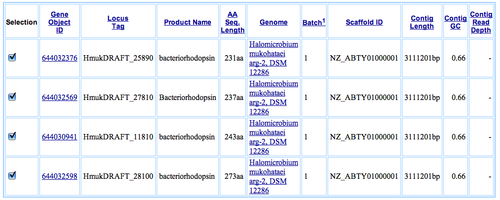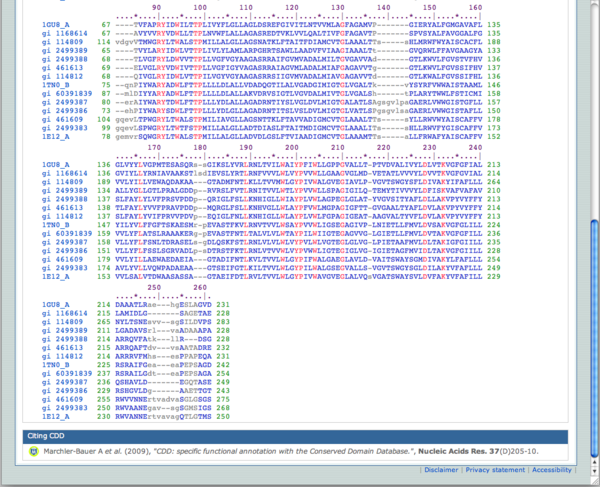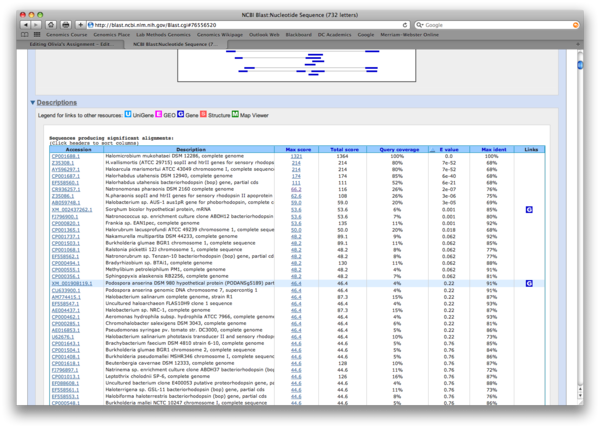Difference between revisions of "Olivia's Assignment"
| (One intermediate revision by the same user not shown) | |||
| Line 14: | Line 14: | ||
[[Image:Mukohataei-rhodopsin.png|thumb|center|500px]]<br> | [[Image:Mukohataei-rhodopsin.png|thumb|center|500px]]<br> | ||
| − | [[http://temp.geobio.uib.no/uploads/documents/species_in_haloarchaea.pdf]] | + | [[http://temp.geobio.uib.no/uploads/documents/species_in_haloarchaea.pdf Species in Haloarchaea]] - may or may not be useful. |
| + | |||
| + | I searched the [http://www.ncbi.nlm.nih.gov/Structure/cdd/cddsrv.cgi?uid=110065 Conserved Domains Database for pFam01036] bacteriorhodopsin. I aligned all 14 rows to compare the bacteriorhodopsin sequences. From this information, I can see the generall diversity within the bacteriorhodopsin gene and identify the species that have the gene. I can then BLAST our genome's bacteriorhodopsin genes to find more dissimilar species - non-halophiles - to compare in a phylogenetic tree. | ||
| + | |||
| + | |||
| + | [[Image:pFam1.png|600px]] | ||
| + | [[Image:pFam2.png|600px]] | ||
| + | |||
== Other Species found to have Bacteriorhodopsin == | == Other Species found to have Bacteriorhodopsin == | ||
| + | When I BLASTned the one of our genome's bacteriorhodopsin (644030941) with very high similarity, I found these hits: | ||
| + | |||
*Natronomonas pharaonis | *Natronomonas pharaonis | ||
*H. vallismortis (ATCC 29715) sopII and htrII genes for sensory rhodopsin II apoprotein and sensory rhodopsin II transducer ACCESSION Z35308 | *H. vallismortis (ATCC 29715) sopII and htrII genes for sensory rhodopsin II apoprotein and sensory rhodopsin II transducer ACCESSION Z35308 | ||
| − | * | + | *Haloarcula marismortui ATCC 43049 chromosome I, complete sequence |
| + | *Halorhabdus utahensis DSM 12940, complete genome | ||
| + | *Pseudomonas syringae pv. tomato str. DC3000, complete genome | ||
| + | *Bradyrhizobiu sp. BTAi1, complete genome | ||
| + | With very dissimilar sequences I found more partial hits that may be useful for searching through to find non-halophiles. I still have not found any literature that details which halophiles and non-halophiles do have this gene, which would make this process faster. | ||
| − | + | [[Image:644030941-dissimilar1.png|600px]] | |
| + | [[Image:644030941-dissimilar2.png|600px]] | ||
| + | [[Image:644030941-dissimilar3.png|600px]] | ||
Latest revision as of 16:48, 22 September 2009
I want to explore the question Does high salinity affect the proton pump? So I'd like to compare the rhodopsin hydrogen pump gene(s) found in H. mukohataei to those found in other halophiles and non-halophiles. Goals/To Do List:
- Find opsin gene(s) for H. mukohataei and other related halophiles
- Find opsin genes in other archaea
- BLASTp and BLASTn
- Compare GC content - does it look like the rest of the host genome
- Make phylogenetic tree based on opsin
Using JGI, I found these known protein sequences predicted to be the proton pump in H. mukohataei:
- 644030941 bacteriorhodopsin
- 644032376 bacteriorhodopsin
- 644032569 Bacteriorhodopsin
- 644032598 bacteriorhodopsin
[Species in Haloarchaea] - may or may not be useful.
I searched the Conserved Domains Database for pFam01036 bacteriorhodopsin. I aligned all 14 rows to compare the bacteriorhodopsin sequences. From this information, I can see the generall diversity within the bacteriorhodopsin gene and identify the species that have the gene. I can then BLAST our genome's bacteriorhodopsin genes to find more dissimilar species - non-halophiles - to compare in a phylogenetic tree.
Other Species found to have Bacteriorhodopsin
When I BLASTned the one of our genome's bacteriorhodopsin (644030941) with very high similarity, I found these hits:
- Natronomonas pharaonis
- H. vallismortis (ATCC 29715) sopII and htrII genes for sensory rhodopsin II apoprotein and sensory rhodopsin II transducer ACCESSION Z35308
- Haloarcula marismortui ATCC 43049 chromosome I, complete sequence
- Halorhabdus utahensis DSM 12940, complete genome
- Pseudomonas syringae pv. tomato str. DC3000, complete genome
- Bradyrhizobiu sp. BTAi1, complete genome
With very dissimilar sequences I found more partial hits that may be useful for searching through to find non-halophiles. I still have not found any literature that details which halophiles and non-halophiles do have this gene, which would make this process faster.





